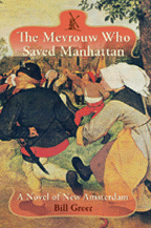Bill's Brownstone
Wander through New York's Past and Present with
the author of The Mevrouw Who Saved Manhattan
New Amsterdammers
"Nobody would hurt Claes Swits. The old man welcomed anyone to his roadhouse on Deutel Bay like he was the prodigal son returning home, Indians and Africans included."-- Jackie Lambert in The Mevrouw Who Saved Manhattan.
The crowd in Claes Swit's roadhouse liked its fun. Claes opened the place on a trail along the east side of Manhattan named after the Weckquasgeek Indians, who traveled it frequently to and from New Amsterdam. It might have been a peaceful, convivial spot looking out on Deutel Bay (about 47th Street today). But after an evening of heavy drinking, the customers often grew a bit rowdy.
Nanne Beech, for example, liked her wine almost as much as her men and on one particular night decided to enjoy both together. After buying a round for the boys, she figured she was entitled to fumble at whatever breeches she wanted. Husband Thomas tried to drag her home. She was not to be persuaded. Thomas, a bit riled and probably drunk too, belted her. Then he took after Peter Gerlyn, who had a history of enjoying Nanne's favors.
On another occasion, Evert Bout threatened to shoot Ulrich Lupoldt, a dog, thief and rascal in the former's opinion. Lupoldt apparently didn't like the shine Bout had taken to a black wench. Bout told him in no uncertain terms he would sleep with whoever the hell he wanted.
But it wasn't trouble with drunks in his tavern that did Claes in. One afternoon he welcomed a Weckquasgeek who had come by for a little trading. Claes knew the fellow, who his son had occasionally hired. He offered refreshment. Little did he know of the longstanding grudge his visitor harbored. As a boy, the Weckquasgeek had come trading with his uncle and other men. He had watched as a group of white men stole the goods and massacred all but the boy. Now he saw his chance for revenge. Spotting an ax, he took it up and while Claes was bent over a chest, he lopped off his head.
When the Weckquasgeeks refused to surrender the murderer, offering his childhood tragedy as excuse, the Director Willem Kieft insisted on war. The people delayed him for over a year. But on the night after the Shrovetide bacchanal in 1643, Kieft launched a massacre of the tribe.
The Mevrouw Who Saved Manhattan Reviews
"[A] romp through the history of New Netherland that would surely have Petrus Stuyvesant complaining about the riot transpiring between its pages ... Readers are guaranteed a genuine adventure that will evoke the full range of human emotions. Once begun, they can expect to experience that rare difficulty in putting down a book before they have finished."
-- de Halve Maen, Journal of the Holland Society of New York, Summer 2009
"Bill Greer has deftly blended fact and fiction in his humorous tale The Mevrouw Who Saved Manhattan. ... The characters are rowdy, raunchy, loveable, and sometimes despicable, but thoroughly believable. ... This is a thoroughly delightful story that brings the Dutch colonies to life."
-- Historical Novels Review Online, August 2009
Bill's Book
The Mevrouw Who
Saved Manhattan
A Novel of New Amsterdam
like etchings by
Van Ostade and Steen."
-- Charles Wendell, Ph.D.,
President of the
New Netherland Institute

on a madcap ride through
New York history.
More about the book.
Amazon
for the Kindle
and the Nook
and see what you think
in Mevrouw
Pegleg Peter Stuyvesant
NY's First Whore Griet Reyniers
NY's First Embezzler
Cornelis van Tienhoven
Troublemaker Anthony the Turk
Indian-killer Willem Kieft
First Mother Catalina Trico
Domines Michaelius, Bogardus and Megapolensis
Van Rennselaer Nephew
Wouter van Twiller
Adultress Nanne Beech
Kosher Butcher Asser Levy
Stuyvesant Foe
Adriaen van der Donck
First Gay Herman van den Bogaert
And many more of the people who launched the tiny Manhattan settlement that
grew into the greatest city
in the world.